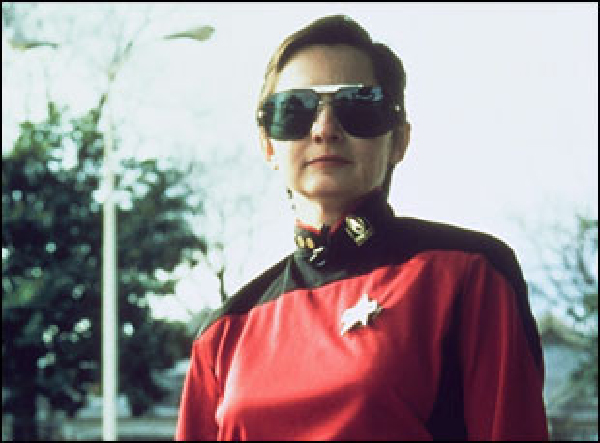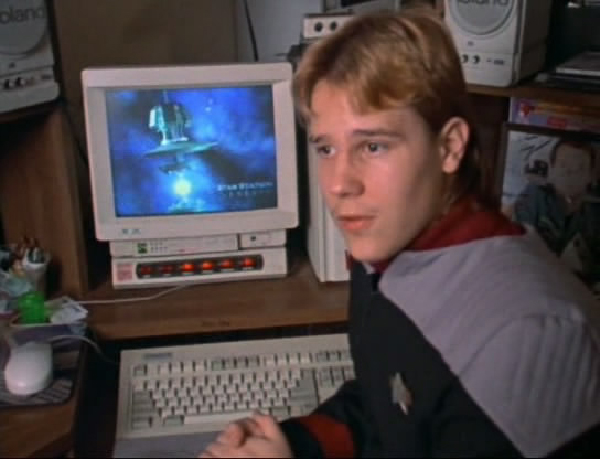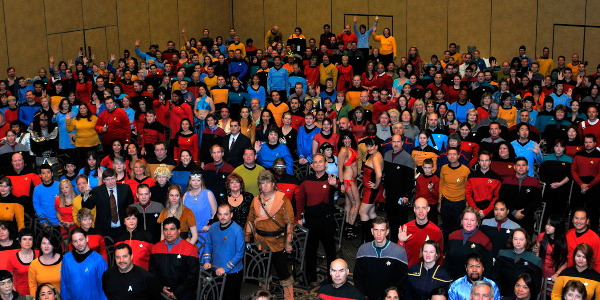Long Lived and Prosperous.
This is where it all began. Conventions, collections and the birth of the fanboy: every gamer owes their heritage to the trekkie. And by ‘gamer’ I mean you not me because I am not a gamer. I do not associate with that term. I’d rather out myself as a habitual internet pornography masturbator than publicly identify as a gamer, in that practically everyone plays games now. If anything it’s unnatural if they don’t considering the number of smartphones rivals the population, and technological capability, of small European countries.
The documentary Trekkies chronicles the simpler time when dorks looked dorky on a genetic level. It visits both the cultural and very personal impacts that Star Trek had, and continues to have, on society.
The initial appeal is the travelling road show of hardcore trekkies. The nerds of yore invented then attended every convention, bought every collectable and dressed their pets and family against their will. They then wrote Kirk/Spock erotic fiction, modelled their dentistry practise on the Enterprise, built fully functioning mobile life-support systems and wore their Federation uniform, every day, while acting as juror to a US national court case.
In fact Lieutenant Commander Barbara Adams, commanding officer of the US Artemis (which is the Little Rock unit of the Federation Alliance), wore her Federation uniform everyday always:
“You can put on a uniform for football year round and nobody cares. Basketball year round, nobody cares. Put on a Star Trek uniform and people get a case of the giggles. I don’t want my officers to ever feel ashamed to wear their uniform.”
Right on, sister. Far from being deluded, they’re aware of their geekery and completely earnest in their passion for Star Trek. Trekkies is a fun and loving scrapbook rather than the faux-informative, snide documentaries of Channel 4. For our US readers some of Channel 4’s docu-sploitations include: The Boy Whose Skin Fell Off, The Undateables, Big Fat Gypsy Weddings, Seven Dwarves, Embarrassing Bodies and I am the Elephant Man. No links will be provided.
The trekkies’ exploits are bizarre but the key difference is that you’re laughing with them laughing at themselves.
“It’s a little bit of history that I’ll preserve. I collect the items when I can get them and they’re wonderful to have. They’re definitely one of a kind items”, says a man in full Klingon garb, complete with ridged Klingon headpiece, having just won an auction for an authentic Klingon headpiece worn on the show.
I once lost out at an auction for a Star Wars comic signed by Ewan McGregor when the bidding passed £200. At least mine was for charity, I think. Sick kids or dogs or something. Still not a gamer though. Didn’t even like the Force Unleashed or my review of it.



Star Trek is cool like heavy metal: despite its age the old continues to attract new fans. Many of those featured identify with the show’s core values of ethics, equality and respect. In true sci-fi fashion they indirectly tackled subjects like racism and politics through the space alien veneer.
They bucked convention and cast multiple ethnicities, in non-stereotypical roles, and placed female characters firmly in positions of authority. It’s pathetic that BioWare’s offering of an alternative box cover for Mass Effect 3 featuring a female leading character is deserving of recognition. The videogame industry’s treatment of women both in content and as an audience is so juvenile and prejudiced at times it’s sickening. As Alan pointed out it doesn’t help when the gamers themselves are “wretched” also.
This is an unfair comparison between a TV series and an industry but what core values underpin games? Aside from escapist entertainment, the newer breed of games like The Stanley Parables or Journeys or Dear Esthers are often ponderous or variations on the “game about games” naval-gazing.
There are plenty of lights in the world and I couldn’t help think of gaming equivalents while watching Trekkies. Several fans discuss cross-dressing as Star Trek characters to explore their sexuality and identity which reminded me of articles from the always unique Borderhouse where people identify in a way similar through their videogame avatars. Some very touching moments are shared by the actors in their dealings with fans genuinely struggling to cope in their lives. I don’t remember the specifics but it put me in mind of an episode of the Quarter to Three podcast where Rollercoaster Tycoon of all games helped a particular man deal with some tough illnesses.
My hero in Trekkies is young Gabriel Köerner who wrote a Trek spin-off movie, designed the costumes and generated the special effects for the ships all on his relic of a personal computing device. When you watch Trekkies (which you will) just know that he went on to become a visual effects artist and worked on Battlestar Galactica, LOST, Shutter Island and, of course, the series finale of Star Trek: Enterprise.
Trekkies is everything a great documentary should be: funny, moving and damn interesting. Not only is it a time capsule of what it meant to be into Star Trek and fandom in the nineties. It’s a testament to the power of Trek but also a valuable time capsule of fandom in the nineties.
I wish I was a trekkie but I’m just a gamer in denial.






